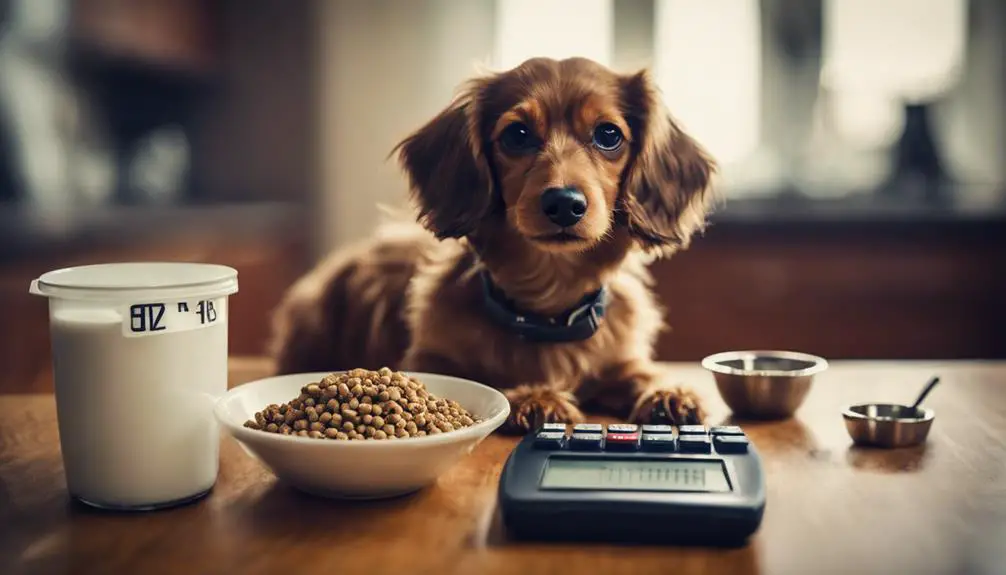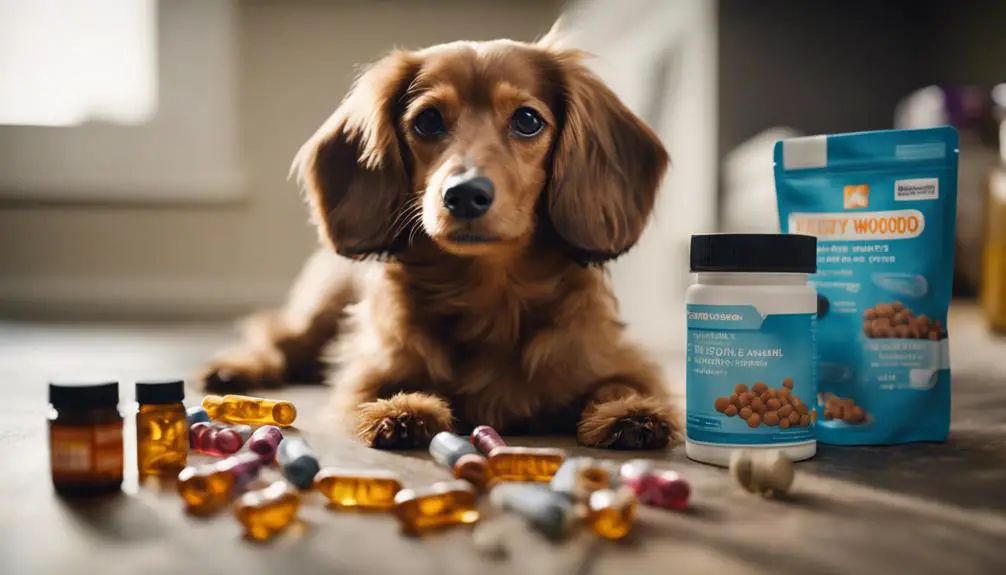Feeding a Doxiepoo: Nutritional Needs and Recommended Foods
Feeding a Doxiepoo, a delightful cross between a Dachshund and a Poodle, requires me to understand their unique nutritional needs. Given their smaller stature, I’ve found that the portion size is generally less than that of larger breeds, often ranging from a quarter to three-quarters of a cup daily.
Whether I choose wet or dry food largely depends on my pet’s preferences and nutritional demands. I’ve discovered that factors such as their exercise routine and the caloric content of their food are key to managing their weight effectively. I often consult with a veterinarian for valuable insights into my Doxiepoo’s dietary regimen.
But the question still remains – what specific nutritional components should I be looking out for?
Key Takeaways
- Doxiepoos require a diet rich in quality proteins, essential fatty acids, vitamins, minerals, and fiber for optimal health.
- A raw food diet offers numerous benefits including muscle growth, healthier coat, weight maintenance, and digestion ease.
- Regular feeding management, including vet consultations and using tools like a raw food calculator, is crucial for maintaining a balanced weight.
- Supplements such as omega-3 fatty acids, probiotics, antioxidants, multivitamins, and joint supplements can enhance a Doxiepoo’s overall health.
Understanding Doxiepoo Nutritional Needs
Doxiepoo nutritional needs require a bit of research to include a diet abundant in top-tier protein, essential fatty acids, and a wide assortment of natural vitamins and minerals. These elements play vital roles in sustaining muscle strength, fortifying immune responses, and imparting a glossy sheen to their coat.
Beyond proteins and fats, a small portion of carbohydrates, hailing from sources such as vegetables, herbs, and berries, can contribute important fiber and micronutrients. This supplementation enhances the richness of a Doxiepoo’s diet. Hydration should not be forgotten; a mix of high-moisture foods and consistent access to fresh, clean water promotes healthy digestion and kidney functionality.
Central to a Doxiepoo’s overall health is a well-rounded diet, encompassing quality meat sources, beneficial fats, vitamins, minerals, and fiber. This balance can be conveniently achieved by choosing FEDIAF-endorsed recipes or buying from trustworthy pre-prepared raw dog food vendors. This ensures your Doxiepoo enjoys nutritionally complete meals.
As you manage your pet’s dietary requirements, bear in mind that each Doxiepoo is an individual, and their dietary needs may shift based on factors like age, activity levels, and overall health. Customizing your pet’s diet according to their unique needs is key to their long-term health and happiness.
Raw Food Benefits for Doxiepoos
Understanding the Advantage of Raw Food for Doxiepoos
Investigating the raw food benefits for Doxiepoos, it becomes evident that this feeding method can dramatically enhance their overall health and help prevent common health issues. The canine anatomy and digestive system of this breed are naturally equipped to effectively process a diet rich in proteins, healthy fats, vitamins, and minerals.
The high-protein diet that raw food offers is in line with the biological needs of Doxiepoos, offering several benefits:
- It supports their energetic lifestyle and encourages lean muscle growth.
- It offers a balanced nutritional profile, incorporating all essential nutrients in their natural state.
- It contributes to a healthier coat, minimizing skin conditions and allergies.
- It assists in maintaining an ideal weight, reducing risks related to obesity.
A major benefit of raw food is its lack of carbohydrates present in kibble, which can be hard for dogs to digest. Indeed, the use of unsuitable ingredients in kibble can result in severe health problems. Therefore, raw food is a more beneficial choice, emphasizing its significance in the diet of Doxiepoos.
A dog’s welfare is always a priority, and ensuring they have the most suitable and beneficial diet is a key part of that. So, when it comes to feeding your Doxiepoo, consider the advantages of a raw food diet, as it may be the key to ensuring your pet enjoys a healthier and happier life.
Calculating The Ideal Amount For Feeding A Doxiepoo


Calculating the ideal amount for feeding a Doxiepoo is a task that requires careful attention to various factors. These include their metabolic rate, physical activity, age, weight, and health objectives.
Doxiepoos, due to their smaller size, don’t require an excessive amount of food each day. It’s crucial to consider not only the quantity but also the quality of their diet, taking into consideration their activity levels and the nutritional value of their meals.
Typically, a doxiepoo’s daily diet ranges from a quarter to three-quarters of a cup of food. The choice between wet and dry food is yours, though it’s always best to consult a vet if you’re uncertain about your dog’s dietary needs.
For a more straightforward approach, consider using a raw food calculator. It’s also recommended to seek a professional opinion from a vet to ensure your Doxiepoo’s dietary requirements are being adequately met. Keeping a regular check on your Doxiepoo’s physical condition is another crucial element in making necessary feeding changes.
| Factor | Consideration |
|---|---|
| Metabolism | Determines the energy requirements |
| Activity Level | Active dogs require more food |
| Age | Different nutritional requirements for puppies and older dogs |
Striking the right equilibrium is crucial. Both underfeeding and overfeeding can result in weight and health complications. Hence, maintaining a consistent feeding routine and performing regular weight checks are fundamental in managing your Doxiepoo’s dietary needs effectively.
Importance of Doxiepoo Weight Management
Doxiepoo Weight Management is a crucial factor in preventing obesity-related health issues. A balanced weight not only contributes to your pet’s overall wellness but also enhances their lifespan significantly. It’s important to note that aspects such as metabolism, activity level, and importantly, the type and quantity of food they eat, play a major role in weight management.
The food you choose for your Doxiepoo can have a significant impact on their weight. Implementing a raw food diet, with the right proportions of ingredients, can promote optimal health. However, it’s not as simple as feeding them any raw food. You need to pay attention to:
- The freshness and safety of raw ingredients
- The balance of protein, fat, and carbohydrates
- The quantity of food, which should align with the Doxiepoo’s weight and age
- Regular weight checks to track any changes
Tools like ProDogs’ raw food calculator can assist in deciding the right amount of food. In the end, a consistent approach to weight management is crucial in preventing obesity and ensuring your Doxiepoo’s health and happiness.
Supplements for a Healthy Doxiepoo


In order to maintain your Doxiepoo’s health and help manage their weight, it’s crucial to pair a well-rounded diet with the right supplementary additions. One of the top choices for most dog owners is Omega-3 fatty acids, which are usually sourced from fish oil. This supplement is not just beneficial for your dog’s skin and coat, but is also a strong supporter of joint health in Doxiepoos.
Another key supplement to consider is probiotics. These are important for promoting a balanced gut flora, which in turn aids digestion – a key factor in a dog’s overall health. Therefore, probiotics are a necessary component of a Doxiepoo’s diet.
In addition to these, antioxidants like vitamin E can be a great addition to your pet’s diet. These help to strengthen the immune system by protecting cells from damage, thereby contributing to your dog’s overall health.
If you’re concerned about potential nutritional gaps in your dog’s diet, multivitamins can be a good solution. Even the most balanced diets can sometimes miss out on certain nutrients, and multivitamins can help ensure your dog receives all the nutrients they need.
Particularly for older Doxiepoos, joint supplements like glucosamine and chondroitin are highly recommended. These supplements support joint health and mobility, which can help promote a healthier and more active lifestyle for your pet.
Frequently Asked Questions
What Is the Lifespan of a Doxiepoo?
The lifespan of a Doxiepoo, contingent upon health issues, exercise needs, and regular vet checks, typically ranges between 10-15 years. Attention to dental care, grooming, weight management, and emotional wellbeing can aid longevity.
What Is the Best Food to Feed My Dachshund?
A Dachshund diet requires high-quality protein, fat, vitamins, and fiber. Considerations for puppy nutrition, senior Dachshund care, allergies, raw vs kibble, homemade meals, obesity prevention, nutritional supplements, food portion sizes, and breed specific nutrition are essential.
How Do You Take Care of a Doxiepoo?
Caring for a Doxiepoo involves regular grooming, fulfilling exercise needs, providing training, monitoring health concerns, scheduling vet appointments, emphasizing socialization, creating a suitable environment, offering appropriate toys, implementing potty training, and ensuring proper dental care.
Are Doxiepoos Aggressive?
Doxiepoo temperament typically isn’t aggressive, but triggers such as fear or poor socialization can incite aggressive behavior. Understanding aggression and managing it through proper discipline, training techniques, and emphasizing socialization are key to aggression prevention in this breed.
Conclusion
Feeding a Doxiepoo involves recognizing their unique food needs. Considering the benefits of raw food and managing their weight are critical for avoiding obesity-linked problems. Supplements can also boost their health. It’s important to consult a vet to ensure the correct diet and feeding plan for your Doxiepoo. Your pet’s well-being depends on it.
Have you had any experience with feeding a Doxiepoo? We’d love to hear about it. If not, why not dig deeper into this topic to learn more about how to best care for your furry friend?





